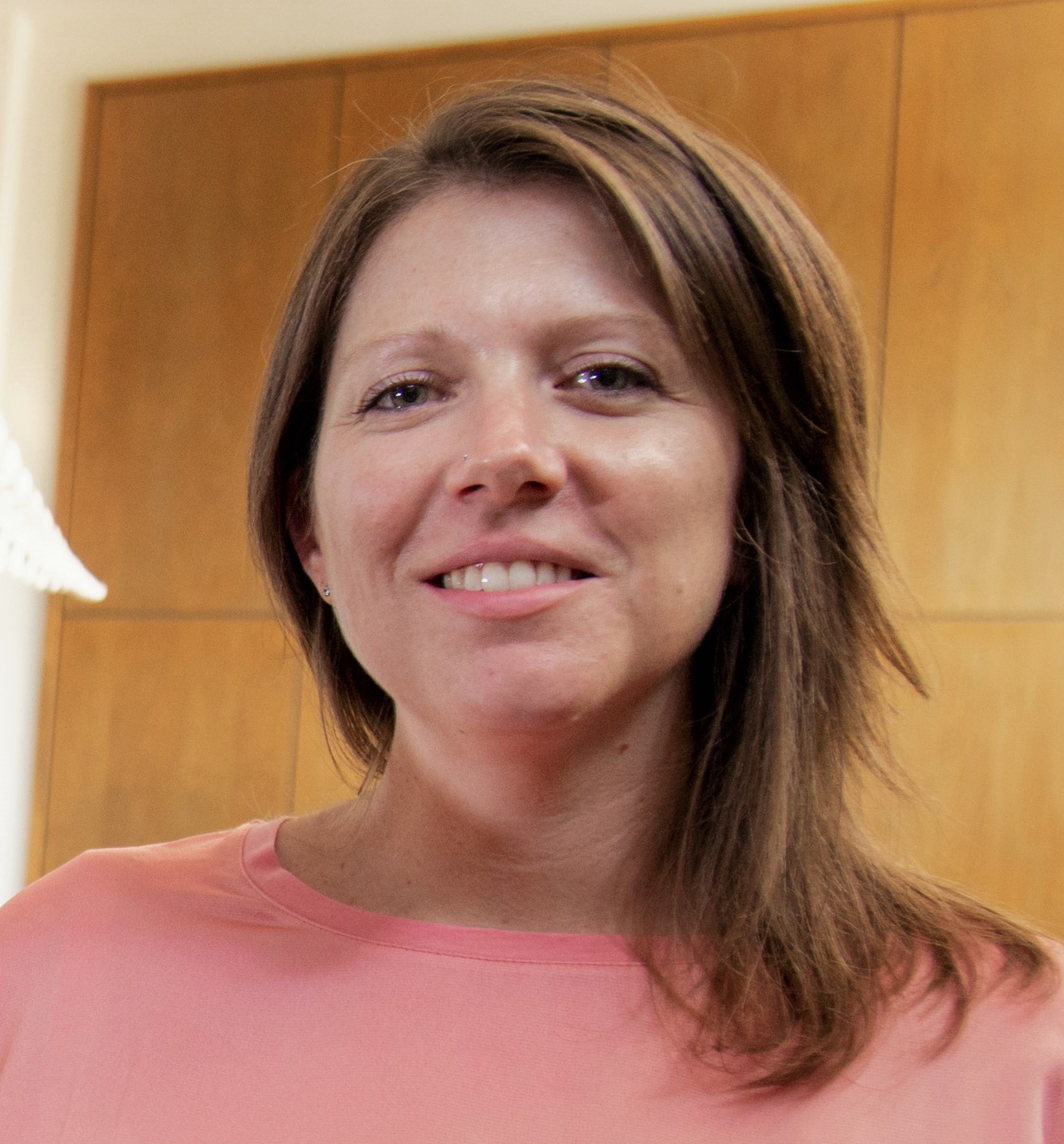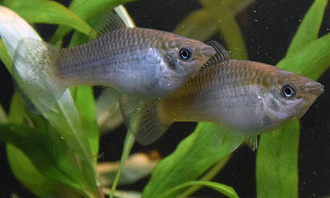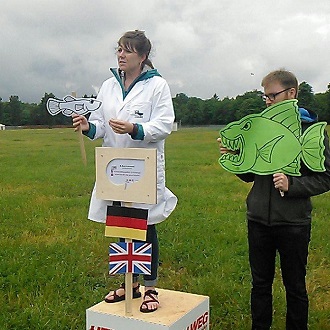 Kate Laskowski
Kate Laskowski
she/her
Assistant Professor
Evolution & Ecology
University of California Davis
;@KateLaskowski
https://laskowskilab.faculty.ucdavis.edu/
Start date: September 2019
PhD: University of Illinois; Advisor: Alison Bell.
Postdoc: Leibniz Institute of Freshwater Ecology & Inland Fisheries; Advisor: Max Wolf, Jens Krause, Thomas Mehner.
About the department:
The EVE department houses about 30 faculty members studying various aspects of ecology, evolution, and behavior. I'm also a member of the Center for Population Biology which is a large cross-departmental organization that brings together any faculty on UC Davis's campus that studies questions related to ecology and evolution. Our graduate students are housed within cross-departmental graduate groups so that students have access to any faculty interested in common research themes; I'm a member of the Population Biology Graduate Group and the Animal Behavior Graduate Group
About the research:
You're unique just like everyone else. But why have you, or any animal, developed such characteristic and distinctive patterns of behavior? The goal of my research is to understand how evolution has shaped the developmental mechanisms that determine how individuals use and integrate all the different sources of information they're exposed to over their lifetimes to determine their behavioral phenotypes. I exploit a naturally clonal fish, the Amazon molly, and high-resolution tracking systems that let me replay the developmental clock to test how and why individuals respond to different experiences in the way they do and what are the consequences of such behavioral changes.
What has been the biggest challenge as a new PI so far?
It's safe to say that my first year as a new professor did not turn out as planned between some professional turmoil (I had to retract 3 papers in the first 3 months of my new position) and then getting hit with the pandemic six months in. But I'd like to think that after these first two years, tenure will be a cake-walk! Learning how to navigate a new university system works and rebuilding my network here has been a major challenge. Though perhaps the most acute challenge has been building a fish room. Fish rooms contain lots of water, and water has a bad habit of being very difficult to contain. I now know far more about epoxy sealant and drains and how to replace ceiling tiles than I ever thought possible.
What has been the biggest surprise so far about being a new PI?
Everyone tells you to expect this, but it's always difficult to imagine until you're faced with it - but wow, so many people want a piece of your time now! And you want to give your time to all these people, but it's just not possible. I thought I had good time management strategies before but I'm having to learn to adjust them and recalibrate how I set priorities.
How have you prepared to be a PI?
After I finished my PhD, I accepted a postdoc position at one of the Leibniz Institutes in Berlin. I ended up staying there for 6 years because I was able to secure my own independent funding. I think it was a really good set of training wheels where I had basically complete academic freedom to pursue the questions I was interested and figure out exactly how to do that, without also having the increased responsibility of all the managerial and administrative tasks that come with being a professor.
How do you/will you approach mentoring new lab members?
My goal is to try and personalize my mentoring as much as possible to each student based on what their long term goals are. I want to help them identify their strengths so we can figure out better ways to help them shine but then just as importantly, help them recognize their weaknesses and look for ways to help improve those areas. I just had my first two students start this past Fall and I think there will be a lot of mutual mentorship going on! They're both very independent and I think joined a new lab because they were excited about the challenge of it and know that they will have just as big an impact on me as I will presumably have on them.
Are you recruiting? If so, how do you/ will you choose new lab members?
I did not recruit any students to start in Fall 2021 because the pandemic has pushed everything back that trying to integrate another new student would be tough. But, I will be looking for at least one new student to start Fall 2022! In terms of how to choose lab members, I value folks that are eager to learn and have enough independence to push their projects forward. I also value whole humans and folks that value the truths that the animals tell us. The two rules of the Laskowski Lab can be summed up as 1) don't be a jerk and 2) don't fake data.
When and why did you become a SSE member?
My love of research started off in undergrad when I worked in a quantitative genetics fruit fly lab (Jeff Leips at UMBC). He was the one who really helped me understand what research is and pushed me to start asking questions about our world. He also supported me to attend several conferences, including a few Evolution meetings! So that is when I first became an SSE member and realized that there were whole organizations devoted to folks like me who were interested in evolutionary questions, which just blew my mind.
When was your first Evolution Meeting, and how did it affect your career?
I presented a poster on my undergrad research at the 2006 conference in Stony Brook and I just remember being blown away by the fact that folks that I had never met before were interested to hear in the work I was doing. It was so cool! I remember going to all the talks and just sitting there feeling mesmerized by all the interesting work. I couldn't take notes fast enough for all the cool information I was learning.
Besides research, how do you promote science?
I've been involved in outreach activities in a number of ways. In my previous position in Germany I would spend time in grade schools, teaching children about animal behavior and why it's cool to study. Studying animal behavior is great because it's really accessible to all folks. I'm looking forward to building my outreach network here in California. In grad school, I received an NSF GK-12 Fellowship that let me partner with a local high school teacher to develop new science curriculum - each class I worked with helped to raise stickleback babies (the fish I worked on at the time) and then designed small experiments to study their behavior. I would really like to recreate sometime similar here.
Do you teach evolution? What concept blows students’ minds?
Not yet! But I think this class will make it into my teaching rotation someday soon and I'm excited to teach it to students. But I took evolution as a course for the first time in undergrad and I remember learning about fitness landscapes and that just seemed like such an intuitive way to visualize and imagine how evolution worked.
How do you think evolutionary research benefits society?
Evolution shows us that incremental change can produce incredible results. But just as importantly, it also teaches us that sometimes the current solution is not necessarily the "ideal" one, but just the one that we're currently stuck with because of past history.
Do you have a time management tip to share?
Be honest with yourself. Sometimes it's really easy to trick ourselves into thinking we're working hard, when we're really not, or we're working hard but not on the high priority items. Every so often when I feel like I've hit a wall productivity-wise, I will start tracking how I spend my time. This lets me see which tasks are getting the most attention from me which I can then compare to my priority list. Most of time I realize these two things are out of alignment so then I can re-adjust and make sure higher priority tasks are getting the attention they deserve.
What one piece of advice would you give to a starting graduate student?
Read broadly and meet with seminar speakers! It's so important to be able to talk to scientists across all sorts of research areas, not just your own niche area. The best way to do that is to read papers outside of your zone and then meet with the visiting speakers to practice "talking shop" with different people. Plus it's just super fun!
What one piece of advice would you give to a postdoc?
Start thinking about what your research "vision" is. What are the big questions that you want to tackle and why are they so interesting to you? This vision will be what sells you to job committees so you need to have a really clear idea of what it is yourself.
How was your first faculty meeting?
Surprisingly enjoyable. You always hear about how interminable faculty meetings can be, but luckily for me, the folks in my department are all incredibly collegial and really care about the research and teaching we do.
Did you ever have something go wrong in a talk?
Not to me personally I don't think. But at one conference, the AV system completely blanked out and I still remember watching Ned Dochtermann pivot to doing an unexpected "chalk talk" where he even re-created his graphs on the whiteboard. It was really impressive to watch!
Do you remember making any mistakes as a trainee; how did you recover?
Too many. I've lost a whole summer's worth of data because I didn't back up some cameras. I've ruined equipment because I didn't double check settings. The only way to recover is to recognize the mistake, own up to it and then learn from it. I've expressed frustration to previous lab mates probably more than I should have. Luckily, I haven't made the same mistakes twice (yet).
What is something most people don’t know about you?
I'm actually a natural introvert but also have such terrible FOMO (fear of missing out) that I've trained myself to be exuberant in social settings. This can be really exhausting for me sometimes but I find the rewards almost always outweigh the stress of it.
What do you enjoy doing in your free time?
I really love knitting and sewing. I am slowly working on creating my own wardrobe by hand. Hopefully it will be ready by the time in-person meetings are a thing again!
 Kate Laskowski
Kate Laskowski
